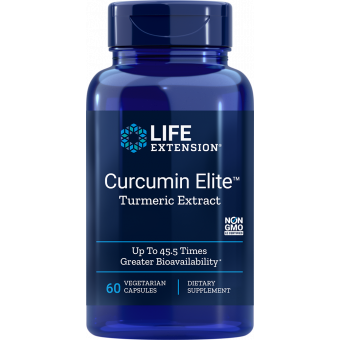Kurkumín a jeho vplyv na dlhovekosť

Kurkuma sa ako korenie používa v Indii v kuchyni i v tradičnej medicíne už tisícky rokov. Z epidemiologických štúdií jestvujú dôkazy, že populácia, ktorá pravidelne konzumuje kurkumu, má nižšiu mieru Alzheimerovej choroby a lepšie kognitívne schopnosti. Veľa vedeckých dôkazov hovorí, že výhody kurkumy možno pripísať hlavne zlúčenine zvanej kurkumín. Kurkumín pomáha procesom, ktoré spomaľujú starnutie a chronické poruchy, vrátane starnutia buniek a chronického zápalu. Celkovým jeho efektom je predĺženie života v zdraví.
Sila kurkumínu
Kurkumín je žltkastý pigment nachádzajúci sa v kurkume, rastline zo zázvorovej rodiny.
V štúdiách sa ukázalo, že príjem kurkumínu predlžuje životnosť rôznych druhov, od škrkaviek až po myši. Napríklad v štúdii na ovocných muškách predĺžil ich priemernú dĺžku života o 26%. Okrem toho výskum naznačuje, že môže pomôcť pri zvládaní mnohých stavov ako napríklad metabolický syndróm, zvýšené lipidy, artritída a ďalších. Veľa štúdií zistilo, že suplementácia kurkumínom viedla k zlepšeniu kognície a pamäti.
Chráni teloméry
Každý reťazec DNA v ľudskom tele má ochranné koncové uzávery, nazývané teloméry, ktoré pomáhajú udržiavať stabilitu a funkciu genetického materiálu. Ako starneme, tieto teloméry sa skracujú. Keď sú príliš krátke, bunka sa stane nefunkčnou alebo zomrie.
Skrátené teloméry obmedzujú regeneráciu a funkciu kmeňových buniek.
Dĺžku existujúcich telomérov vytvára enzým nazývaný telomeráza. Ide o tzv. anti-aging enzým.
V predklinických štúdiách sa ukázalo, že kurkumín podporuje expresiu a aktivitu telomerázy, čím zabezpečuje zdravie a predlžuje život buniek.
Podporuje funkcie mozgu
V štúdiách na zvieratách sa ukázalo, že kurkumín:
- pomáha vytvárať nové neuróny v hipokampe
- zlepšuje výkon pri pamäťových testoch
- znižuje neurologický zápal
- chráni pred stratou pamäte.
Výhody kurkumínu však ďaleko presahujú jeho neuroprotektívnu funkciu.
Bojuje proti glykácii
Glykácia nastáva, keď sa cukry viažu na bielkoviny, tuky alebo nukleové kyseliny, čo spôsobuje škodlivé štrukturálne a funkčné zmeny. Je hlavným prispievateľom k zrýchlenému starnutiu a mnohým chorobám vyššieho veku.
Tento proces sa vyskytuje dokonca aj u ľudí s normálnou hladinou glukózy v krvi. U diabetikov a prediabetikov sa glykácia zrýchľuje, čo vedie k rýchlejšiemu starnutiu a vyššiemu riziku chronických porúch.
Predklinické štúdie ukázali, že kurkumín chráni bunky a tkanivá pred poškodením spôsobeným glykáciou.
Istý tím výskumníkov dokázal, že v modeloch bunkových kultúr môže kurkumín blokovať škodlivé účinky aj vtedy, keď už došlo ku glykácii. Tým zabraňuje zápalu a bunkovej dysfunkcii spôsobenej pokročilými konečnými produktmi glykácie.
Redukuje starnúce bunky
Ako bunky starnú, prestávajú plniť svoju funkciu a emitujú pri tom proteíny, ktoré degradujú enzýmy. Starnúce bunky navyše odmietajú odumierať, a tak nemôže byť vytvorené miesto pre zdravé bunky. Starnúce - senescentné bunky tiež vylučujú zápalové zlúčeniny, ktoré poškodzujú okolité tkanivá.
Kurkumín preukázal v predklinických štúdiách senolytickú aktivitu, čo znamená, že má potenciál znižovať počet starnúcich buniek v tkanivách.
V iných podobných modeloch sa tiež ukázalo, že pomáha priaznivo modulovať sekréciu zápalových zlúčenín z týchto buniek.
Reguluje životne dôležité bielkoviny
Maladaptívna (neprispôsobivá) aktivita rôznych základných štrukturálnych a funkčných proteínov v bunkách je spojená so zrýchleným starnutím, metabolickými abnormalitami a chronickým zápalom.
Kurkumín moduluje ich aktivitu spôsobmi, ktoré zvrátia zmeny súvisiace s vekom a chránia bunky pred poškodením súvisiacim s vekom.
• Inhibuje (potláča) nukleárny faktor-kappa B (NF-kB), proteínový komplex spojený s chronickým zápalom,
• Znížuje aktivitu mTOR, proteínu spojeného s rýchlym starnutím a metabolickými abnormalitami, ktoré prispievajú k chronickým ochoreniam,
• Zvýšuje aktivitu AMPK, enzýmu, ktorý podporuje zdravý metabolizmus,
• Posilňuje funkciu sirtuínov, bielkovín dôležitých pre udržanie zdravia a dlhovekosti a
• Podporuje aktivity Nrf2, proteínu, ktorý reguluje obranyschopnosť organizmu proti oxidačnému stresu.
Ďalšie mechanizmy proti starnutiu
Kurkumín má ešte oveľa viac účinkov proti starnutiu. Okrem zníženia rizík ochorení kurkumín:
• Pôsobí ako silný lapač voľných radikálov, pomáha predchádzať oxidačnému stresu, ktorý sprevádza väčšinu chronických ochorení súvisiacich s vekom,
• Spúšťa produkciu telu vlastných antioxidačných enzýmov,
• Znižuje chronický zápal, ďalší faktor starnutia a chorôb súvisiacich s vekom,
• Podporuje zdravú funkciu mitochondrií a
• Aktivuje autofágiu, bunkové „upratovanie“, aby omladilo bunky a udržalo ich optimálne fungovanie.
Čo potrebujete vedieť o kurkumíne je, že je to živina proti starnutiu
Vedci identifikovali procesy, ktoré poháňajú starnutie a riziko chorôb, vrátane oxidačného stresu, chronického zápalu, glykácie, starnutia buniek, straty telomérov a ďalších.
Zistilo sa, že kurkumín, polyfenol v kurkume, ovplyvňuje každý z týchto procesov spôsobmi, ktoré zlepšujú zdravie a môžu spomaliť starnutie.
V štúdiách na zvieratách je príjem kurkumínu spojený s dlhovekosťou a zníženým rizikom chronických ochorení súvisiacich s vekom.
Štúdie na ľuďoch ukazujú, že užívanie kurkumínu zlepšuje kogníciu a pamäť.
Zvyšovanie biologickej dostupnosti kurkumínu
Samotný kurkumín má nízku biologickú dostupnosť.
Veľká časť kurkumínu, ktorý konzumujete, sa nevstrebáva do krvného obehu.
Vedci zistili, že kombinácia kurkumínu s galaktomananmi zo senovky gréckej zvyšuje biologickú dostupnosť viac ako 45-krát v porovnaní s neformulovaným kurkumínom.
Kombinácia kurkumínu s inými živinami, konkrétne turmerónov z kurkumy a gingerolov z koreňa zázvoru, môže ďalej zvýšiť jeho biologickú dostupnosť a zdravotné prínosy.
Vyskúšajte preto vysoko absorbovateľný kurkumín Life Extension Curcumine Elite, ktorý obsahuje extrakt z kurkumy a senovky gréckej! Tento kurkumín má až 45-násobne vyššiu biologickú dostupnosť oproti bežnému kurkumínu!
Zdroj:
Life Extension Magazine Jan/Feb 2023, p. 56-60, Retail Edition



Zanechajte svoj komentár